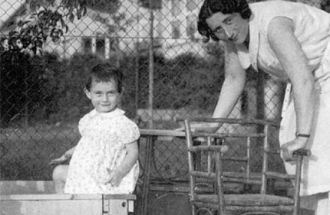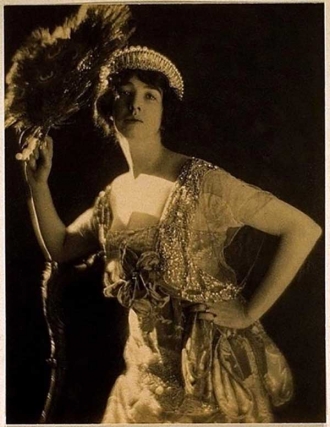Advertisement
Advertisement
S Himaneesh
About me:
I haven't shared any details about myself.
About my family:
I haven't shared details about my family.
Interested in the last names:
I'm not following any families.
Updated: February 23, 2018
Message S Himaneesh
Loading...one moment please


Recent Activity
S Himaneesh
commented
Dec 31, 2017 11:06 PM
Photos Added
S hasn't shared any photos yet.
Recent Comments
S Himaneesh
commented
Dec 31, 2017 11:06 PM
S Himaneesh
commented
Dec 31, 2017 11:05 PM
S Himaneesh
commented
Dec 31, 2017 11:05 PM
S Himaneesh
commented
Dec 31, 2017 11:04 PM
S Himaneesh
commented
Dec 31, 2017 11:04 PM
S's Followers
Be the first to follow S Himaneesh and you'll be updated when they share memories. Click the to follow S.
Favorites
Loading...one moment please


AncientFaces
This account is shared by Community Support (Kathy Pinna & Daniel Pinna & Lizzie Kunde) so we can quickly answer any questions you might have.
Please reach out and message us here if you have any questions, feedback, requests to merge biographies, or just want to say hi!
2020 marks 20 years since the inception of AncientFaces. We are the same team who began this community so long ago. Over the years it feels, at least to us, that our family has expanded to include so many. Thank you!
2020 marks 20 years since the inception of AncientFaces. We are the same team who began this community so long ago. Over the years it feels, at least to us, that our family has expanded to include so many. Thank you!
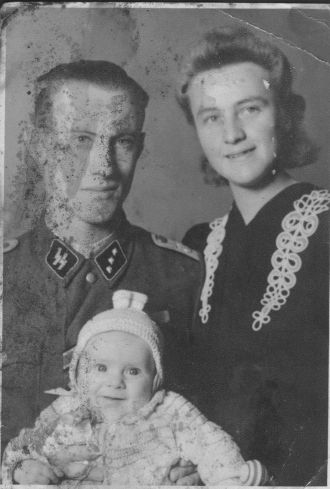
soldier
Perhaps Nazi soldier and family
My father, Dixon Etheridge, brought this photo home from the European Theater of World War II. My mother kept it along with family photos. I suspect my father removed it from the body of a dead German soldier. The stains on the photo appear to be blood.
If this is your family or relative I will gladly give the photo to you. On the back of the photo in green ink is written "Hab uns immer Lieb!"
My father, Dixon Etheridge, brought this photo home from the European Theater of World War II. My mother kept it along with family photos. I suspect my father removed it from the body of a dead German soldier. The stains on the photo appear to be blood.
If this is your family or relative I will gladly give the photo to you. On the back of the photo in green ink is written "Hab uns immer Lieb!"

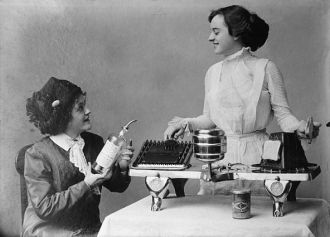
Kitchen appliance
A 1910's photo of the newest electrical appliance - for a quick convenient breakfast?

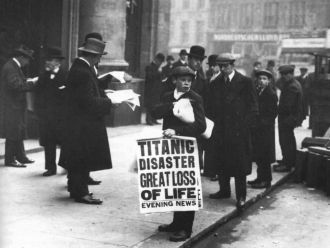
Titanic Disaster - Newsie
A young newsie holding a sign which reads "Titanic Disaster - Great Loss of Life. Evening News" is surrounded by gentlemen on their way to work reading the local newspaper regarding the tragedy.
The Titanic was advertised as "unsinkable" and because of this, and the fact that some of the wealthiest and best known people of the time were on the Titanic, the sinking of the ship was big news at the time. The loss of life was massive, Of the approximately 1317 passengers and 885 crew, less than 1/3 survived. There was confusion about the exact count of passengers and crew since many people cancelled their bookings at the last minute, others traveled under aliases, and some were counted twice on casualty lists.
The Titanic hit an iceberg at 11;40p on April 14th and sunk in the early morning hours of April 15th . . . this is a picture of one of the earliest reports of the sinking at a time in which papers were the king of news reporting.
The Titanic was advertised as "unsinkable" and because of this, and the fact that some of the wealthiest and best known people of the time were on the Titanic, the sinking of the ship was big news at the time. The loss of life was massive, Of the approximately 1317 passengers and 885 crew, less than 1/3 survived. There was confusion about the exact count of passengers and crew since many people cancelled their bookings at the last minute, others traveled under aliases, and some were counted twice on casualty lists.
The Titanic hit an iceberg at 11;40p on April 14th and sunk in the early morning hours of April 15th . . . this is a picture of one of the earliest reports of the sinking at a time in which papers were the king of news reporting.

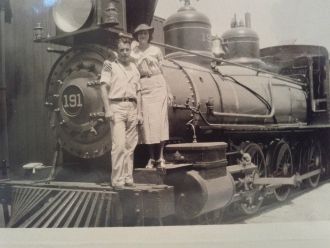
Raymond A Stamm & Edith Peggy Batson
A photo of Raymond A Stamm & Edith Peggy Batson: My grandma Peggy with my grandpa Ray, probably in St. Louis Missouri
People in photo include: Raymond A. Stamm and Edith Peggy (Batson) Stamm
People in photo include: Raymond A. Stamm and Edith Peggy (Batson) Stamm

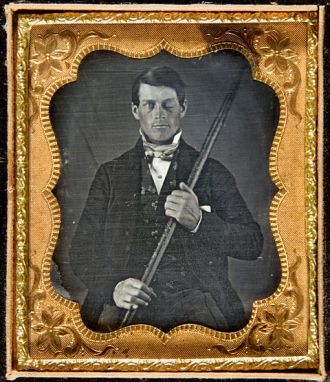
Phineas Gage
A photo of Phineas Gage in 1850, holding the tamping iron that caused his brain injury. He was a construction foreman (in charge of blasting) on the railroad, age 27, when an accidental early explosion occurred. The explosion drove a tamping iron (large iron rod, 1.25 inches in diameter) into his head. A large part of his left frontal lobe was destroyed.
After the accident, with the bar still in his head, it is reported that he sat up, talked, and walked to a wagon. Sitting in the wagon for the 3/4 mile ride into town, he was seen by a doctor. The doctor said:
"When I drove up he said, "Doctor, here is business enough for you." I first noticed the wound upon the head before I alighted from my carriage, the pulsations of the brain being very distinct. The top of the head appeared somewhat like an inverted funnel, as if some wedge-shaped body had passed from below upward. Mr. Gage, during the time I was examining this wound, was relating the manner in which he was injured to the bystanders. I did not believe Mr. Gage's statement at that time, but thought he was deceived. Mr. Gage persisted in saying that the bar went through his head. Mr. G. got up and vomited; the effort of vomiting pressed out about half a teacupful of the brain [through the exit hole at the top of the skull], which fell upon the floor."
The doctor removed some coagulated blood, some of the protruding brain, and some skull (bone) fragments, then bandaged his head and cheek.
Gage survived but his personality and temperament were changed. Later in his life, some social skills and personal skills returned and he worked as a stagecoach driver in Chile and later as a farmworker in Santa Clara County, California.
He died of an epileptic seizure (which was being treated by bleeding) in San Francisco, CA on May 21, 1860 at age 37.
After the accident, with the bar still in his head, it is reported that he sat up, talked, and walked to a wagon. Sitting in the wagon for the 3/4 mile ride into town, he was seen by a doctor. The doctor said:
"When I drove up he said, "Doctor, here is business enough for you." I first noticed the wound upon the head before I alighted from my carriage, the pulsations of the brain being very distinct. The top of the head appeared somewhat like an inverted funnel, as if some wedge-shaped body had passed from below upward. Mr. Gage, during the time I was examining this wound, was relating the manner in which he was injured to the bystanders. I did not believe Mr. Gage's statement at that time, but thought he was deceived. Mr. Gage persisted in saying that the bar went through his head. Mr. G. got up and vomited; the effort of vomiting pressed out about half a teacupful of the brain [through the exit hole at the top of the skull], which fell upon the floor."
The doctor removed some coagulated blood, some of the protruding brain, and some skull (bone) fragments, then bandaged his head and cheek.
Gage survived but his personality and temperament were changed. Later in his life, some social skills and personal skills returned and he worked as a stagecoach driver in Chile and later as a farmworker in Santa Clara County, California.
He died of an epileptic seizure (which was being treated by bleeding) in San Francisco, CA on May 21, 1860 at age 37.
People tagged:

